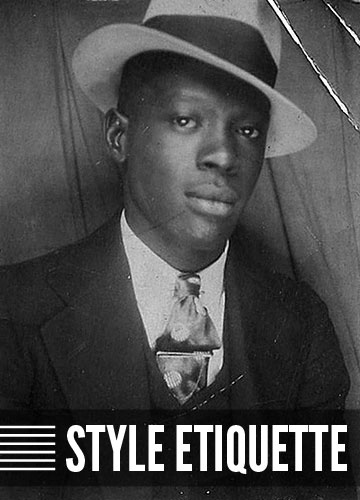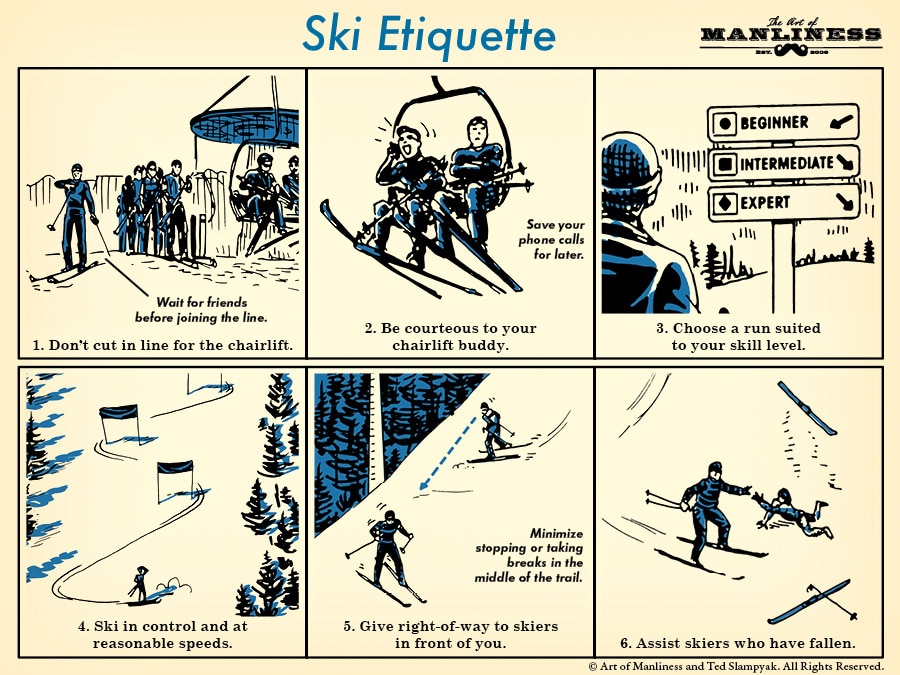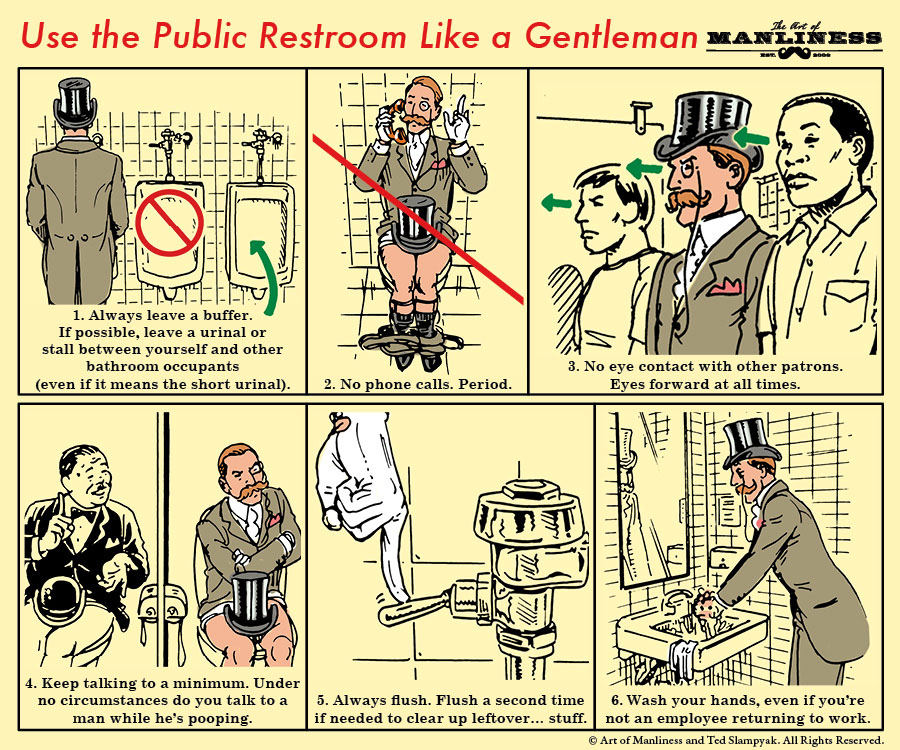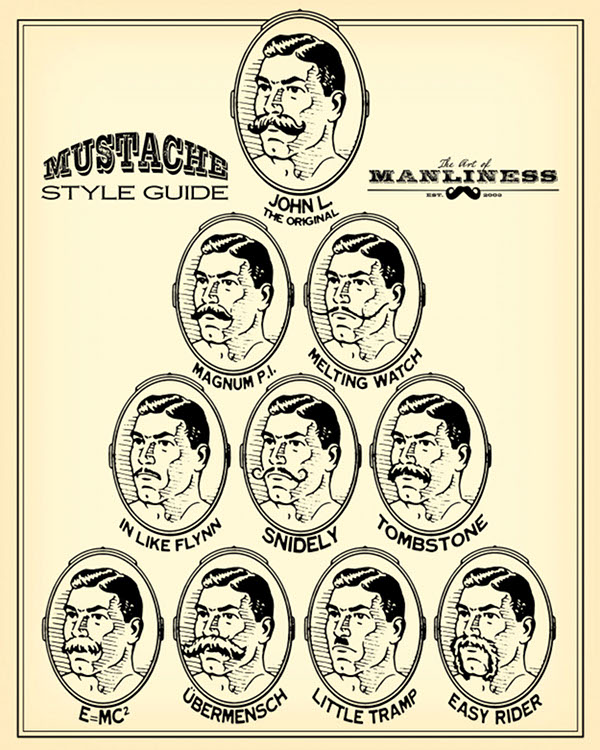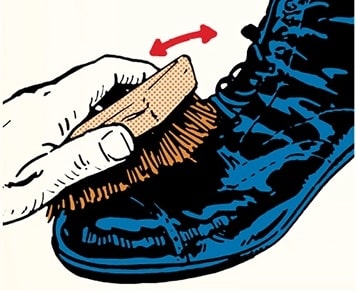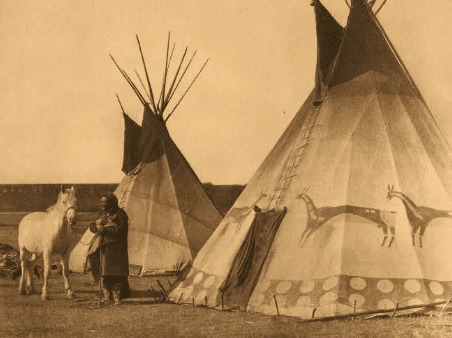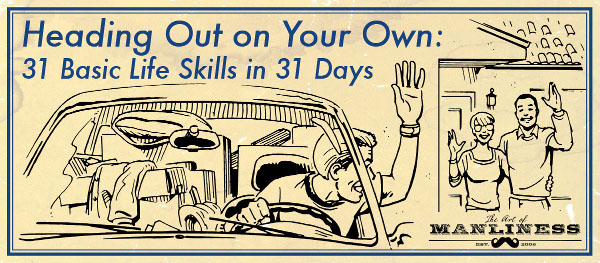
This article series is now available as a professionally formatted, distraction free paperback or ebook to read offline at your leisure.
In whatever society, or in whatever part of the world, a gentleman may happen to be, he always complies externally with the spirit and usages of the place… A gentleman always possesses a certain self-respect—not indeed touching upon self-esteem, and far removed from self-conceit…Indeed a gentleman, in the highest signification of the term, is a noble animal…Employing in the regulation of his own conduct, the strictest standard of propriety, and in his expectations of that of others, the most lenient; cautious in accepting quarrel, more cautious in giving cause for it; lending to virtue the forms of courtesy, and borrowing from her the substance of sincerity; forming his opinions boldly, expressing them gracefully; in action, brave, in conference, gentle; always anxious to please, and always willing to be pleased; expecting from none what he would not be inclined to yield to all; giving interest to small things, whenever small things cannot be avoided, and gaining elevation from great, whenever great can be attained; valuing his own esteem too highly to be guilty of dishonor, and the esteem of others too considerately to be guilty of incivility; never violating decency, and respecting even the prejudices of honesty;…full of courage, but free from ostentation; without assumption, without servility; too wise to despise trifles, but too noble ever to be degraded by them; dignified but not haughty, firm but not impracticable, learned but not pedantic; to his superiors respectful, to his equals courteous; kind to his inferiors, and wishing well to all. –Richard Wells, Manners, Culture and Dress of the Best American Society, 1894
Manners. Etiquette. For some men, these words don’t belong in the same breath as manliness. For them, etiquette and manners conjure up arbitrary lists of dos and don’ts, a nagging mother, or scenes of artificial formality, complete with images of bowing and scraping, the polishing of monocles, and a bunch of treacly, “How do you dos?” and “No, after yous!”
It wasn’t always so. Our forbearers saw no contradiction in being ruggedly manly and a refined gentleman. For centuries, well-bred men were trained in all the manly arts, from the skills needed to be a soldier to the proper etiquette for dinner parties. They were quintessential gentlemen—dapper in dress, polite in conduct, and yet every bit a true man.
George Washington, Theodore Roosevelt, and Robert E. Lee are some examples of men who combined gritty manliness with gentlemanly bearing. They paid attention to how they dressed, groomed, and conducted themselves and were as comfortable at a stately ball as they were on the battlefield. For these great men, having good manners did not make them less of a man, but more of one.
This is because they saw good manners in the way Edward John Hardy, author of Manners Makyth Man, defined them: as “little morals,” “the shadows of virtues, if not virtues themselves.” If character was the root of inner manliness, then manners were the outer fruits that sprouted from the tree – the external behaviors and code of conduct that naturally followed from a life of virtue. These great men understood that while it is true that the rules of etiquette change over time and from culture to culture, the underlying principles of all manners remain constant: a respect for others, and a desire to treat all people with honesty and consideration – just as you’d like to be treated.
Still unconvinced? First let’s take a more specific look at some misconceptions about manners, and then at the reasons you should cultivate them.
What Good Manners Are Not
A young man’s negative opinion on manners sometimes springs from observing others practice them badly. But these are not true manners, for:
Good manners are not stiff, formal, or awkward. Good manners should come off as entirely natural. Some young men, knowing this and not wanting to seem like they’re trying too hard, swing the opposite way, and try so hard to be “natural” in their manners that they come off as even more contrived! Real naturalness comes from a few things:
- Forgetting yourself and concentrating on others. The more you focus on making others comfortable, the less self-conscious you will feel, and the more comfortable you will become yourself.
- Catering your behavior to the crowd and event in which you find yourself. Your manners should be more formal when visiting the White House than when eating at Chili’s.
- Practice. Good manners shouldn’t be something you cram for in emergencies like studying for an exam. Rather, they should be a habit you develop through practice over time, like a leather coat that gets softer, more comfortable, and better-looking the more you wear it.
- Cultivating an inner sense of character. This is most important. At its root, naturalness in manner springs from your sincerity and desire to treat people well for the right reasons; as mentioned above, it should be a natural extension of your character. Even if you do end up being a little awkward, if it comes from a sincere place, people will be very forgiving of it.
Good manners are not ostentatious. Good manners should never be showy or call attention to themselves. In fact they should not even be immediately noticeable in the moment and instead should create an overall positive impression, which the people with whom you interact only reflect on later: “I really enjoy his company.” “I had such a good time at his party.”
Good manners are not smug and judgmental. You don’t practice good manners to feel superior to others or to wield them as a club, policing people’s behavior. As Charles Dickens once wrote: “My boy,” said a father to his son, “treat everyone with politeness—even those who are rude to you. For remember that you show courtesy to others not because they are gentlemen, but because you are one.”
Why Practice Good Manners?
Good manners give you confidence. Much of what constitutes good manners consists of common sense. Yet common sense can often fail us when we’re nervous, in unfamiliar territory, and just winging it. Look at manners as the signposts along the broad highway of common sense, guiding you in how to act and react in any situation, without veering off and getting lost in the thickets when you’re not sure what to do.
Good manners make a positive impression on others. A man with good manners makes enjoyable company, a welcome party guest, a referable contact, a trusted employee. Good manners attest to a man’s self-respect and self-control, qualities that apply to all areas of life. Plus, as good manners are in such short supply these days, they instantly put you head and shoulders above other young men out there.
Good manners add texture to life. In our day-to-day lives, we often just move from one thing to another, as each day bleeds into the next. Thus from time immemorial people have sought a break from the ordinary by creating festivals, rituals, special occasions. But special occasions aren’t special if we behave and dress exactly as we do in our everyday lives. Manners provide a unique texture to our lives, and contribute to adding a special atmosphere to special events – the solemnity of a funeral, the pomp of a wedding, the grace of a baptism, the significance of a graduation, even the escape of a movie. At the same time, creating this atmosphere is a community effort –with the guy in a t-shirt and shorts, the ringing of a cell phone, or the man walking in late, the spell is broken.
Good manners make things in life smoother, more pleasant, and more comfortable for everyone. Ironically, manners both add texture to life, and make our interactions smoother. Many old etiquette books described manners as the substance that “oils the creaking wheels of life.” While we’d like to think that left to our own devices, everything would just flow naturally between people, without any guidelines on how to act – who does what and when – a whole lot of awkwardness and impoliteness ensues.
Good manners make other people feel comfortable. Ever been at a dinner where a guy brought up embarrassing stories from someone’s past, or insisted on pontificating about politics? Have you ever been with a friend who started talking to someone who was a stranger to you, but never stopped to introduce you to him, leaving you standing there awkwardly? “For what is a good manner?” William John Hardy wrote, “It is the art of putting our associates at their ease. Whoever makes the fewest persons uncomfortable is the best mannered man in the room.”
Good manners ultimately show respect for others. Do you like to wake up early to meet someone, only to have them be 20 minutes late? Do you enjoy it when your friend throws a tantrum after losing a round of golf? Would you like it if you made $2.50 an hour, busted your butt serving people, and then got stiffed on a tip? Do you appreciate being interrupted while you’re speaking? No? Then live the heart of good manners: the Golden Rule. Treat others with the same respect you’d like to be treated with.
In summary, good manners make life richer and more enjoyable for you and for others. Unfortunately, many young men are raised with very little guidance on the proper manners to cultivate for different areas of their lives. The good news is that good manners can be learned by any young man no matter his background (and by any older man, no matter his age).
We’ve written about the basics of etiquette extensively in the past, and while we still have a few areas to hit, have covered nearly all the essentials. So below we put together this etiquette study guide for a young man seeking to become a more dignified gentleman. Go through these links at your own pace, brushing up on the ins and outs of good manners, a little bit at a time.
Essential Etiquette for Young Men
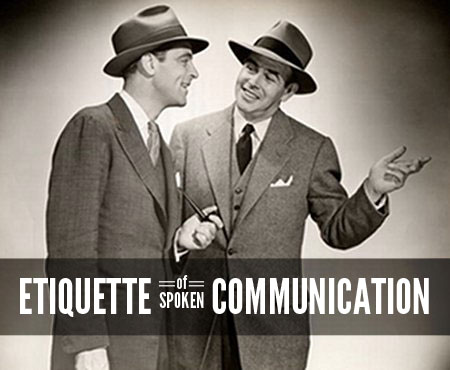
- How to Debate Politics Civilly
- The Dos and Don’ts of Conversation
- How to Avoid Conversational Narcissism
- How to Listen Effectively
- The Art of Small Talk: 5 Questions to Never Ask
- How to Avoid Giving a Backhanded Compliment
- How to Accept a Compliment With Class
- 37 Conversation Rules for Gentlemen From 1875
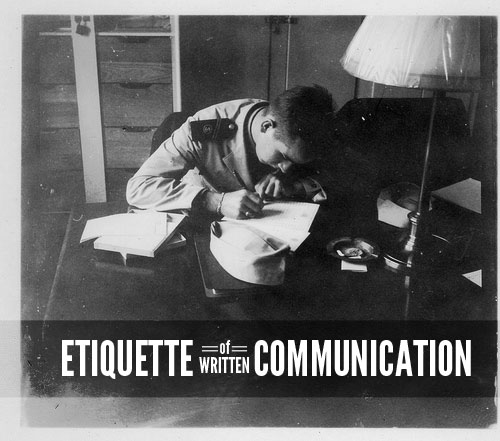
- How to Write a Letter
- How to Write a Sympathy Note
- How to Write a Thank You Note
- How to Write a Note of Congratulations
- How to Write an Email That Will Get a Response
- Being a Gentleman in the Age of the Internet: 6 Ways to Bring Civility Online
- 3 Ways You Should Never Start a Comment Online
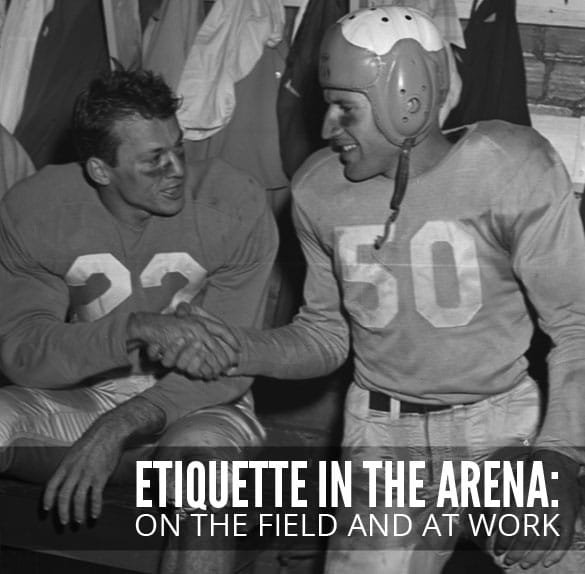
- How to Celebrate with Grace
- How to Lose with Dignity
- A Guide to Sportsmanship
- The Dos and Don’ts of Business Etiquette
- How to Use the Public Restroom Like a Gentleman
- Classroom Etiquette For the College Man
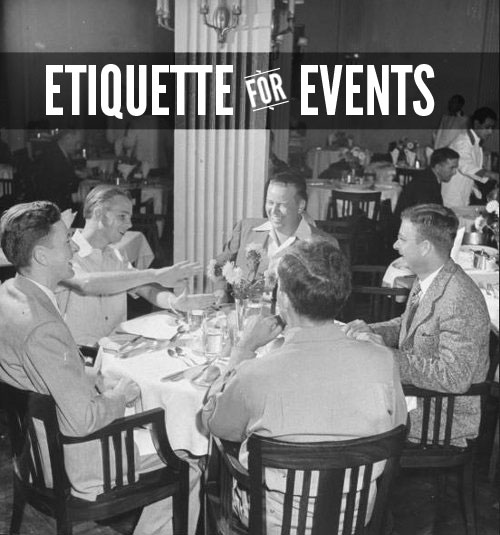
- A Man’s Primer on Funeral Etiquette
- A Gentleman Never Arrives Empty-Handed
- A Man’s Guide to Dining Etiquette and Proper Table Manners
- Dinner Date Etiquette
- How to Be a Gracious Host
- How to Be the Perfect Houseguest
- How to Be a Perfect Party Guest
- How to Be the Perfect Party Host
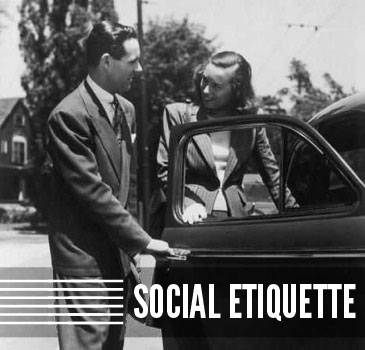
- How to Shake Hands Like a Man
- How to Make Introductions
- The Importance of Being on Time
- The Reasons You’re Late and How to Always Be on Time
- How and When to Open Doors for a Woman
- How to Apologize
- 10 Ways to Be a Gentleman at the Gym
- Guide to Tipping
- The Unclassified Laws of Etiquette
- I Want You…To Put Away Your Smartphone
